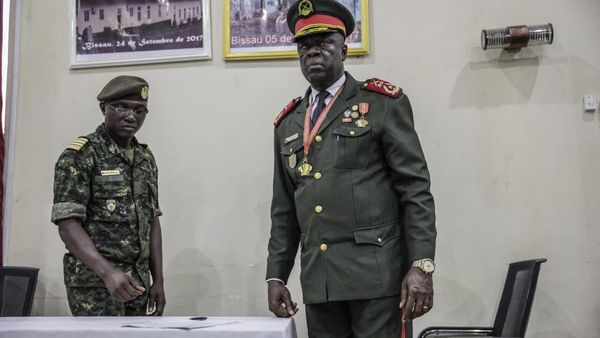
A 62-year-old father named Maher Tarabishi visited the ICE field office in Dallas, Texas, on 28 October as he has done each year for 17 years. Tarabishi, originally from Jordan, is in the US on a supervision order. Even though his asylum claim was denied, the US government allowed him to remain in the country because he is the primary caretaker for his son, Wael, who was diagnosed at four years old with a progressive muscle disorder called Pompe disease.
Tarabishi’s mandatory annual visits to ICE were never eventful; he’d arrive, an official might ask about Wael’s condition, and then he would leave. This time was different.
On the warm late fall day in Dallas, Tarabishi and several others were detained by ICE agents. When Tarabishi didn’t come home and his family didn’t hear from him, they panicked. As his daughter-in-law, Shahd Arnaout, told the Guardian, the family usually hears from Tarabishi “every five minutes”.
Four hours after his arrest, he called his family to tell them what happened. ICE claims Tarabishi is a “criminal alien” and a member of the Palestine Liberation Organization, which the US designated a terrorist organization in 1987.
“My father has lived in the United States for decades and has never committed a crime,” Wael said in a statement to a local news station. “He has never been part of any terrorist organization. He has always followed the law, paid his taxes and attended every immigration appointment on time.”
To his family, Tarabishi’s detainment reeks of racism and shows the Trump administration is eager to detain as many people as they can. Meanwhile, Wael, who is now 30, has been admitted to the hospital following infections in his lungs and his blood. With his primary caretaker incarcerated and no release in sight, other family members have stepped in to help Wael while calling for his father’s release.
“Right now he’s feeling like he doesn’t want to live anymore,” Arnaout said of Wael, “because they took the main reason that he’s fighting for”.
During Donald Trump’s second term, ICE has dramatically expanded arrests and detentions of people who have never been charged with or convicted of a crime. As of this writing, nearly 74% of the agency’s detainees have no criminal convictions. Immigration arrests have also increased in every state, with Texas leading the way.
Being arrested at a required check-in is a common feature of the second Trump presidency. It’s become a standard practice in Dallas, though Tarabishi’s family says he had no concerns about showing up for his October visit.
“He’s been doing it for years,” Arnaout said, “and it was supposed to be just another day.”
When the Guardian reached out to ICE and asked about Tarabishi’s case, a Department of Homeland Security spokesperson shared a statement that read, in part, “ICE’s successful arrest of Tarabishi shows clear evidence of the game-changing impact the Trump administration’s immigration enforcement efforts are having to restore common sense to our immigration system, strengthen national security and public safety in our country by arresting terrorists like this.”
After the arrest, Tarabishi’s family was told he would be held at Prairieland detention center, less than 40 miles from Dallas. But days passed without hearing from him, and the family could find no record of his detention at Prairieland. With help from an activist who combed detention records, the Tarabishis ultimately discovered that Maher had been transferred to a facility in Anson, Texas, roughly three hours from their home.
Since that discovery, the family has been able to talk to him by phone almost every day. They call Tarabishi an “unbelievably emotional guy”, who feels terrified and out of place in detention, surrounded by people who are decades younger than him.
“He keeps saying, ‘Don’t forget about me. Don’t leave me alone,” Arnaout said.
He also begins each call with the same question: “How’s Wael doing?”
The arrest was devastating for his son, whom multiple family members described as Tarabishi’s best friend. The father and son have been inseparable for Wael’s entire life, and Tarabishi has an encyclopedic knowledge of Pompe disease. The illness causes progressive muscle weakness, enlarged organs and severe respiratory issues, and when people are diagnosed at a young age, the outlook is often grim.
“The doctor told him, ‘You’re not going to make it past five,’” Arnaout said of Wael. “I’m looking at him now, and he’s 30.”
According to her and Wael’s mother, this is due in large part to Tarabishi’s painstaking care. Though he works as an electrical engineer, he was by his son’s side through dozens of surgeries, constantly lifting his spirits.
“Maher was his case manager, his equipment company, his doctor, his everything,” said Wael’s mother, who asked the Guardian not to use her name.
A few weeks after Tarabishi was detained, Wael was hospitalized with several infections at once. At one point, his heart stopped beating.
When his family called to tell his father the news, they heard Tarabishi collapse. They reassured him that Wael regained consciousness and is now getting care, but it was little solace to Tarabishi, who started praying between sobs.
When he was interviewed for this story, Wael was lying in his hospital bed, hooked up to multiple tubes and monitors. He had difficulty talking, so most of the time, his sister-in-law stepped in to explain what he was trying to say. He talked about his father (“He’s my miracle,” he said) and their mutual love for the Dallas Mavericks. When the Luka Dončić trade came up, Wael quickly said, “I don’t want to talk about it.”
His cousin, mother and sister-in-law were all by his side, and when the conversation turned to his father, tears dribbled from Wael’s side.
“I don’t want him to cry a lot, because every time he cries and he gets emotional, his oxygen level will drop,” his mother said.
Arnaout stepped in to emphasize, once again, how dire the situation is for both father and son.
“I want this son to be returned with his father today, before tomorrow,” she said. “We are at the point where we’re not trying to lose either of them.”







